Disclosure: Privacy Australia is community-supported. We may earn a commission when you buy a VPN through one of our links. Learn more.
Top 7 Best Crypto Wallets in Australia for 2024: Secure Your Digital Assets
Finding the best crypto wallet Australia crypto enthusiasts could ask for, can be difficult these days, especially with so many options out there. In this guide, we’re putting the spotlight on the top 7 crypto wallets available to Australians in 2024. We’ll break them down by their features, security protocols, and overall usability.
And, if you’re just getting started in the world of cryptocurrency, check out our guide on how to invest in cryptocurrency.
Whether you’re just stepping into the world of crypto or you’re a seasoned trader, these wallets will empower you to securely store and efficiently manage your digital assets.
So, what is the best crypto wallet in Australia? Without further ado, we’ve narrowed down to the best of the best for you, so let’s begin!
Table of Contents
- TL;DR
- Criteria Breakdown Summary
- eToro
- Zengo Wallet
- Trezor Model One
- Exodus
- Binance Wallet
- CoinSpot
- CoolWallet
- Notable Mentions
- Frequently Asked Questions
- Final Thoughts
TL;DR
- eToro Money Crypto Wallet: Best for beginners with seamless integration into the eToro trading platform and strong security features.
- Zengo Wallet: Offers advanced security without private key risks, featuring biometric verification and Web3 integration.
- Trezor Model One: The first hardware wallet, ideal for offline storage with strong cryptographic protection.
- Exodus Wallet: A user-friendly software wallet supporting over 260 cryptocurrencies with built-in exchange and real-time market updates.
- Binance Web3 Wallet: Provides non-custodial storage, DApp support, and smooth integration with the Binance exchange.
- CoinSpot Wallet: Highly praised for easy AUD deposits/withdrawals and strong security, making it great for Australian users.
- CoolWallet: Combines hardware security with mobile app convenience, offering cold storage with Bluetooth functionality.
Criteria Breakdown Summary
When selecting the best crypto wallets for Australians, we took a good hard look at security features like two-factor authentication (2FA), multi-signature support, and offline storage. We also researched factors like ease of use, what types of crypto is supported by the wallets, and if it works on different devices (your phone, your laptop, etc).
Additionally, we considered what others had to say about the wallet online, associated fees that come along with using this crypto wallet, and customer support team’s availability to you and response times. If you’re looking for a more detailed analysis on all things crypto, be sure to check out our comprehensive cryptocurrency guide.
eToro Money Crypto Wallet
Best Known for: Integration with eToro Platform and User-Friendly Interface
The eToro Money Crypto Wallet is known as an all-in-one solution. This is because it seamlessly links users to the eToro trading platform. As one of the best crypto wallets in Australia, eToros is a match made in heaven for beginners. It simplifies storing, receiving, and sending cryptocurrencies, making it an ideal choice for those new to crypto investing.

Unlike standalone wallets, eToro’s wallet integrates directly with its strong platform, making transfers between trade and storage both effortless and smooth.
What sets eToro apart are its portfolio management tools, like CopyTrader and Smart Portfolios, which enable users to track and mirror successful crypto strategies. With real-time market data and crypto-to-crypto conversions, the wallet definitely optimises portfolio management. It does so by providing users a safe and efficient experience. Whether you’re looking to monitor your assets or automate your trading, eToro offers a comprehensive solution. See our guide to crypto portfolio trackers to learn more.
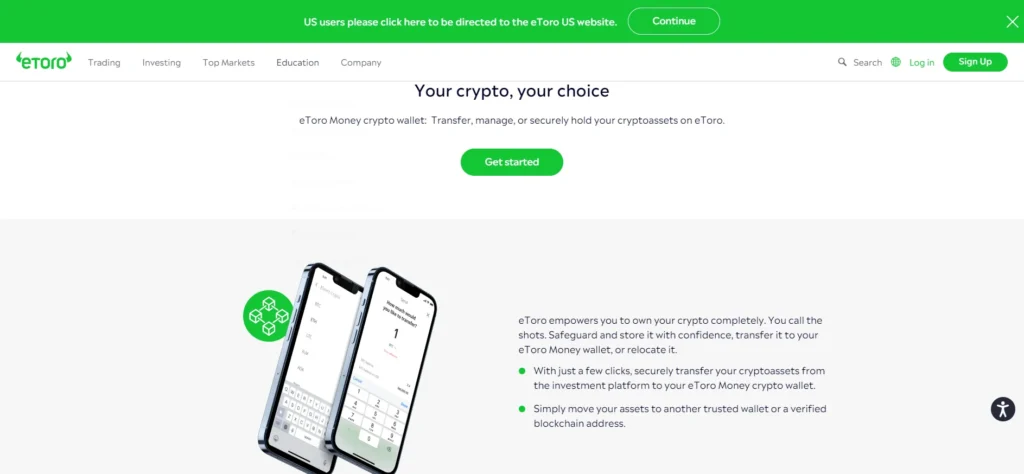
Features
When it comes to the best crypto wallet, the eToro Crypto wallet is one of the best for Australians with security in mind and features such as:
- Secure storage with multi-signature capabilities
- Crypto-to-crypto conversions within the wallet
- Private key access for complete control over your assets
- Built-in recovery service linked to your eToro account
- Mobile-friendly apps for iOS and Android
- Real-time price tracking and market updates
External wallet compatibility for seamless transfers
Pros
- Seamless integration with the eToro platform for easy trading and transfers
- User-friendly interface tailored to beginners and intermediate users
- Built-in crypto conversion tool
- Strong security features, including multi-signature and private key access
- Availability on mobile devices for on-the-go access
Cons
- Custodial nature means eToro has initial control over private keys
- Limited advanced features for DeFi or DApp interactions compared to other wallets
- Heavily tied to the eToro ecosystem, which may not appeal to advanced users or those outside the platform
Criteria Evaluation
- Security: 4/5
- Supported Cryptocurrencies: 4/5
- User-friendliness: 5/5
- Compatibility: 3/5
- Features: 4/5
- Reputation: 5/5
- Cost: 5/5 (free to use, with standard network fees)
- Customer Support: 4/5
Community Reviews and Expert Recommendations
When determining for yourself just what is the best crypto wallet in Australia, it’s important to know that many users like the eToro Money Crypto Wallet for its intuitive design, strong security features and how seamlessly it integrates right alongside the eToro trading platform. This makes it a strong option, especially for beginners.
Experts applaud its robust security features, such as multi-signature protection and DDoS safeguards, though experienced users may find its lack of support for DApps and DeFi tools a drawback. Nevertheless, it remains an excellent option for eToro users prioritising secure storage and uncomplicated transactions.
Here’s what others are saying online about eToro as an Australia best crypto wallet:
“eToro makes it easy for me to trade different financial assets, such as stocks and exchange-traded funds (ETFs) listed on the NYSE and NASDAQ and cryptocurrencies, which would have otherwise been challenging or a hassle for me as I live in Southeast Asia.” G2 review
For a more in-depth look at all of zoro’s offerings, be sure to check out our eToro review.
Price: Free
The eToro Money Crypto Wallet is free to download and use. There are no fees for storing assets in the wallet, but network fees apply when making blockchain transactions.
Zengo Wallet
Best Known for: Keyless Security and Facial Recognition Recovery
Zengo truly stands out as a non-custodial wallet that offers the highest level of security without the typical seed phrase vulnerabilities. It’s designed to store cryptocurrencies and NFTs while giving users access to DeFi platforms for trading and staking. Three key factors set Zengo apart:

- A wide range of supported currencies
- Ease of use, with 24/7 in-app support
- Unmatched security, eradicating private key risks
Unlike most wallets, Zengo uses Multi-Party Computation (MPC) technology. That means there’s no single point of failure for private keys.
With advanced encryption and biometric security like 3D FaceLock, Zengo safeguards assets while offering seamless recovery. Its cutting-edge security infrastructure integrates smoothly with Web3 applications, creating a reliable and comprehensive solution for managing digital assets.
For crypto investors looking for both ease and security, Zengo delivers just the right blend of convenience and confidence for a worry-free experience and the best crypto wallet Australia has to offer.
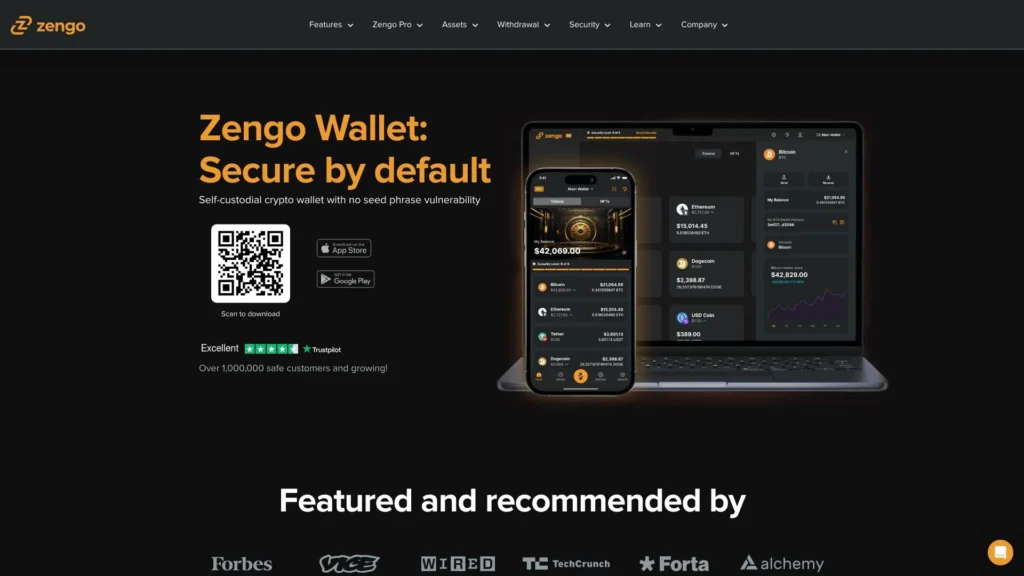
Features
Zengo is among the best crypto wallets in Australia due to features like these:
- MPC technology: Institutional-grade security with no private key vulnerabilities
- 3D FaceLock: Biometric verification for secure access and account recovery
- Web3 firewall: Protects against unauthorised Web3 transactions
- Legacy transfer: Ensure your assets are passed to loved ones with ease
- 24/7 in-app support: Get immediate help whenever you need it
- Supports over 1,000 assets: Including cryptocurrencies, tokens, and NFTs
- Real-time market data and portfolio tracking: Stay informed with up-to-date information
Pros
- A high number of currencies (120+)
- Easy to use and learn from even as a beginner with crypto
- 24/7 live customer support directly through the app
- Innovative keyless security eliminates risk of lost private keys
- Facial recognition recovery provides peace of mind
- Built-in exchange and Web3 functionality
- Regular updates with new features and supported assets
Cons
- Disallows certain coins to be traded in certain states
Criteria Evaluation
- Security: 5/5
- Supported cryptocurrencies: 4/5
- User-friendliness: 5/5
- Compatibility: 4/5
- Features: 4/5
- Reputation: 4/5
- Cost: 4/5 (free basic version, paid pro version)
- Customer support: 4/5
Community Reviews and Expert Recommendations
When it comes to locating the best crypto wallet in Australia, we took to looking into the words of others across the community to see what they’re saying about Zengo. Many have positive things to say and it seems to be a hit among users who prioritise safety, security and keeping things simple and innovative. Many people love how innovative the wallet’s interface is and the peace of mind that’s provided by the keyless security model.
Here’s one review we’d like to highlight about the Zengo Crypto wallet:
“I’m a fairly new user to ZENGO.. but I find their fees very reasonable.. Customer support is very attentive.. if you’re looking for an alternative to what you’re currently using I highly recommend this group.. customer support gave me personalized attention I really like that..” – TrustPilot review
“The app is very user friendly and easy to navigate. A new wallet address is generated for each deposit which increases the security of the wallet which is not something that many other Crypto wallets do. Also, when I’ve had questions or concerns, the customer service representatives I’ve spoken with were friendly, helpful, and quick.” –G2 review
Additionally, to learn more about this platform, you can take a look at our Zengo review. Within it, we provide a more in-depth answer intel about the Zengo platform that covers what matters the most to users who are looking for a fortress to keep their digital assets safe.
Price
Zengo offers a free basic version with core wallet functionality. A Pro version is available for $129.99 per year, providing additional features such as premium support and advanced security options.
Trezor Model One
Best Known for: Open-Source Transparency
Trezor Model One, the first hardware wallet ever created, has earned the trust of crypto enthusiasts for over a decade. Built for offline security, it offers multi-layered defences, including two-factor authentication (U2F). Its intuitive Trezor Suite interface empowers users with full control over their digital assets while maintaining strong security.

With its open-source firmware and software, the Trezor Model One supports many different cryptocurrencies and leverages advanced cryptographic tools like BIP39 seed phrase generation. As one of the best crypto wallets in Australia, the Trezor Model One makes it simple to safeguard assets and manage passwords offline.
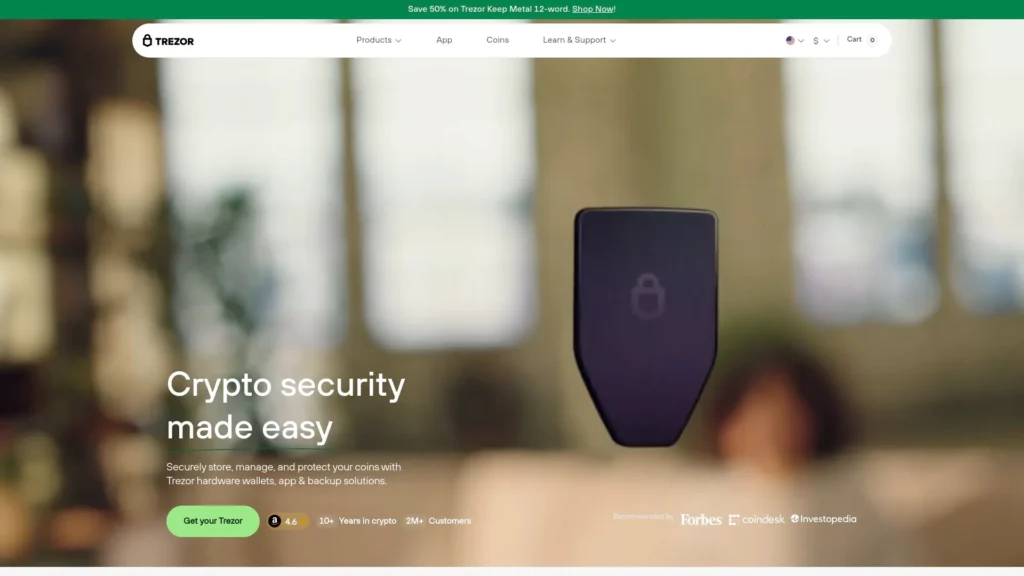
Features
Here’s what makes this one of the best hardware crypto wallets in Australia:
- Open-source firmware and software: Transparency for maximum security
- Secure microcontroller: Ensures safe storage of private keys
- BIP39 seed phrase generation: Standard for secure backups and recovery
- GPG encryption: Enhances secure communication
- FIDO2 authentication: Adds an extra layer of online identity protection
Supports a variety of coins and tokens: Manage multiple assets in one place
Pros
- Transparent, open-source security model
- User-friendly interface with clear display
- No battery required, reducing potential points of failure
- Strong reputation and long-standing presence in the market
- Regular firmware updates and active community support
Cons
- Slightly dated design compared to newer models
- Limited storage space for cryptocurrency apps
- No Bluetooth or wireless connectivity options
Criteria Evaluation
- Security: 5/5
- Supported cryptocurrencies: 4/5
- User-friendliness: 4/5
- Compatibility: 4/5
- Features: 3/5
- Reputation: 5/5
- Cost: 5/5
- Customer support: 4/5
Community Reviews and Expert Recommendations
Those who have used the Trezor wallet consider it one of the most secure hardware wallets in the world. It has a proven track record that keeps your funds safe. Many say it’s easy to set up and use as Satoshi labs has made everything open source and the company has a commitment to ongoing development. Experts recommend the Trezor for strong safety.
Here’s what users are saying about the Trezor crypto wallet:
“Trezor is my trusted hard wallet. It has a great reputation of being one of the safest wallets on the market. Its wallets and software are easy to use, and its online support team is helpful when there is a question.” –TrustPilot review
“The team has to spend time and effort to invesitigate the project I mentioned which they did. I was ready to buy a new trezor (I already have 2) but the team guided me to take needed steps to secure the funds and reset the old wallet then boom you have a brand new Trezor wallet! Trezor wallet is really the best crytpo wallet. The cold wallet is safe and the team also helps to when you have questions to solve your issue and beyond.” –TrustPilot review
Price: $138.00-$268.00
The Trezor Model One provides a cost-effective entry point into hardware wallet security, offering robust protection at a price point accessible to most crypto enthusiasts.
Exodus
Best Known for: User-Friendly Desktop and Mobile Interface
Exodus is a highly popular software wallet known for its sleek and intuitive design, making it an excellent choice for those seeking an easy way to manage their varied crypto holdings. With its built-in exchange feature, users can effortlessly swap assets without leaving the wallet environment.

While it doesn’t match the security levels of hardware wallets, Exodus strikes a fine balance between convenience and sufficient protection for everyday traders.
As one of the best crypto wallets Australia crypto investors can count on, it supports over 260 currencies and integration with cold storage such as Trezor. Exodus offers versatility for both active traders and long-term holders. Advanced features such as portfolio tracking and real-time market updates further enhance its appeal for users looking for simplicity.

Features
When it comes to the top crypto wallets in Australia, Exodus offers some rich features worth taking a look at:
- Non-custodial with client-side encryption: Full control over private keys
- Multi-device support: Available on desktop, mobile, and browser apps
- Supports over 260 cryptocurrencies: Including Bitcoin, Ethereum, and Solana
- Real-time price charts and alerts: Keep track of the market in real time
- Instant exchange: Swap assets without needing an external exchange
- Staking and DeFi integration: Earn passive income directly from the wallet
Pros
- Extremely user-friendly interface with visual appeal
- Built-in exchange for convenient crypto swaps
- Supports a wide range of cryptocurrencies
- Regular updates with new features and assets
- Excellent customer support
Cons
- Not fully open-source, which may concern some users
- Lacks some advanced features like multi-signature support
- Higher exchange fees compared to dedicated trading platforms
Criteria Evaluation
- Security: 4/5
- Supported cryptocurrencies: 5/5
- User-friendliness: 5/5
- Compatibility: 5/5
- Features: 4/5
- Reputation: 4/5
- Cost: 5/5 (free software wallet)
- Customer support: 4/5
Community Reviews and Expert Recommendations
When looking at various crypto wallets in Australia, Exodus has garnered a pretty strong following that’s worth noting. However, there’s also a variety of opinions among the crypto community that should also be considered when looking into this particular wallet.
Many users say the wallet is easy to use, especially for beginners. When it comes to security, users state that the wallet is secure enough for crypto veterans but it does lack 2FA security.
Additionally, reviewers state that the wallet is a self-custody wallet so they have full control over their assets. However, many state that scammers sometimes pose as Exodus and contact users with spoofed emails in an attempt to steal their crypto funds.
Here’s the good and the bad in terms of reviews for Exodus:
“Retrieving Dormant Coins: Didn’t know how I would be able to retrieve my coins. Went to find them in a wallet and discovered the wallet was no more. They had changed how they operate. Fortunately, working with EXODUS I was able to retrieve them. If every business was as nice, helpful, responsive and efficient as they are, the world we be a tremendously better place.” –TrustPilot review
“Swap was frozen, funds gone. Went to swap ALOT of the money that I own within the Exodus app, the swap was frozen by support – I reach out to support and get no response, by not being careful and using this app I have now lost almost 5 years worth of money….
Please be careful when deciding which crypto platform you use” –TrustPilot review
Price
Exodus doesn’t charge any fees,but nearly all blockchain transactions will incur a network fee (commonly known as gas) when sending cryptocurrency. Exodus doesn’t collect any portion of these fees. 100% of the transaction fees are directed to the network to process and validate the transaction.
Binance Wallet
Best Known for: Integration with Binance Exchange and Extensive DApp Support
The Binance Web3 Wallet is a highly secure, non-custodial wallet designed to seamlessly integrate with Binance’s trading platform. It allows users to manage, send, and receive cryptocurrencies across multiple blockchain networks, with a particular focus on supporting decentralised applications (DApps).

Its robust security and strong multi-chain capabilities make it a standout choice for users actively engaging in the broader Web3 space.
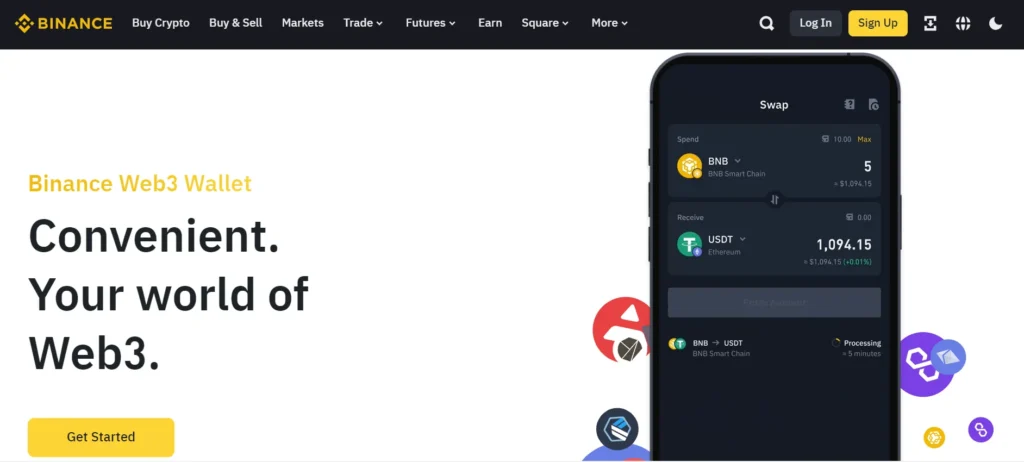
Features
With crypto wallets in Australia, you may want features like you get from Binance:
- Private key management: Full control over your keys with secure client-side encryption
- DApp support: Easy access to DApps across the Binance Chain, Smart Chain, and Ethereum
- Cross-chain compatibility: Supports multiple blockchain networks, including Binance Chain, Binance Smart Chain, and Ethereum
- Custom RPC settings: Allows for advanced blockchain network interactions
- Secure storage: Assets protected with a secure random number generator for key creation
- Real-time market data: Provides live market updates and price alerts
Batch transactions: Efficient token management with support for batch transactions
Pros
- Seamless integration with Binance exchange for easy trading
- Extensive support for DApps across multiple blockchains
- Non-custodial nature gives users full control over their assets
- Regular updates and new feature additions
- Access to Binance’s wide range of financial products
Cons
- Tied to Binance ecosystem, which may not appeal to all users
- Complex features may overwhelm cryptocurrency newcomers
- Regulatory concerns in some jurisdictions due to Binance association
Criteria Evaluation
- Security: 4/5
- Supported cryptocurrencies: 5/5
- User-friendliness: 4/5
- Compatibility: 4/5
- Features: 5/5
- Reputation: 4/5
- Cost: 5/5 (free software wallet)
- Customer support: 4/5
Community Reviews and Expert Recommendations
Overall in the community, reviews of the best crypto wallets in Australia tend to be varied. That said, even the Binance wallet has some users happy with its security features, while others are complaining about customer service and withdrawal issues. Experts such as Forbes state that Binance is an excellent choice for both intermediate and advanced traders because it has many features and quite the selection of coins, opportunities to earn, and even advanced trading tools.
Here’s some reviews we found helpful when researching this crypto wallet:
“Excellent cryptocurrency trading platform. Throughout my time using Binance, I have found it to be very trustworthy and secure as a cryptocurrency exchange platform.” –G2 review
“Best passive income. Amount of currencies and tokens that they offer, copytrading with a fair fee and beneficts for the trade leader.” –G2 review
Price
The Binance Trust Wallet is free to download and acts as the official wallet for Binance users. That said, users are also welcome to opt for any compatible crypto wallet they prefer. Keep in mind, however, that standard network fees are applied for transactions on the respective blockchains.
CoinSpot
Best Known for: Easy AUD Deposits and Withdrawals
CoinSpot is a prominent Australian cryptocurrency wallet and exchange, celebrated for its straightforward approach to managing AUD deposits and withdrawals. The platform has many cryptocurrencies available making it among the best crypto wallets in Australia and an excellent choice whether you’re a beginner or an intermediate investor.

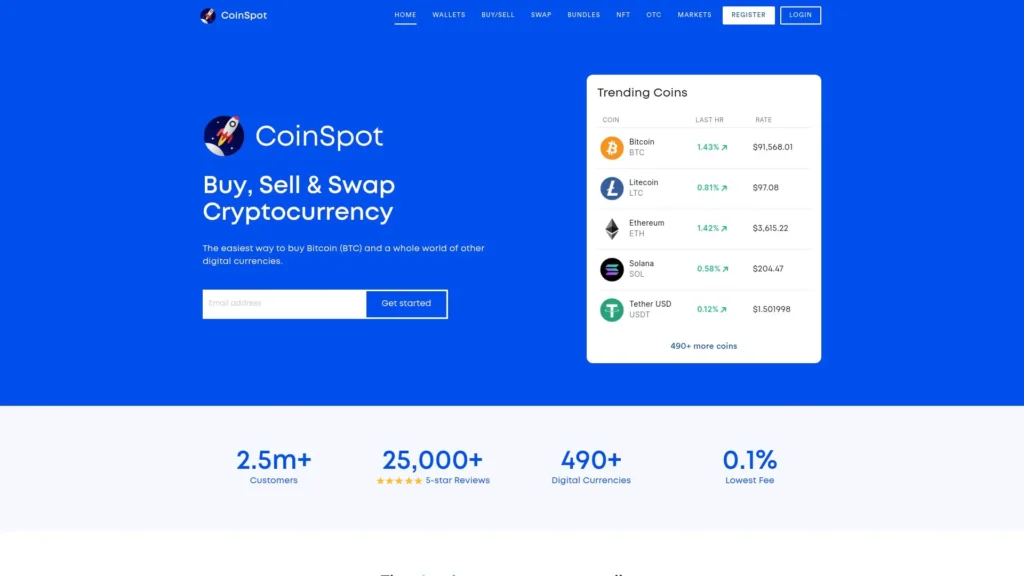
Features
The CoinSpot wallet is undoubtedly among the best crypto wallets in Australia with features designed to make trading and storage accessible to Australian users such as:
- User-friendly interface: Easy navigation with simple buy/sell options
- Cold storage: The majority of funds are kept in cold storage for security
- Multi-signature technology: Provides enhanced security for all transactions
- Two-factor authentication (2FA): Adds another layer of account security
- Instant AUD deposits: Supports quick AUD deposits via PayID, POLi, and other methods
- Crypto credit card: Offers the ability to spend cryptocurrency with a crypto credit card
API access: Supports automated trading strategies with API access
Pros
- Easy AUD deposits and withdrawals for Australian users
- User-friendly interface suitable for beginners
- Wide range of supported cryptocurrencies
- Strong security measures including regular audits
- Compliant with Australian regulations
Cons
- Higher fees compared to some international exchanges
- Limited advanced trading features for experienced traders
- Primarily focused on the Australian market
Criteria Evaluation
- Security: 4/5
- Supported cryptocurrencies: 5/5
- User-friendliness: 5/5
- Compatibility: 4/5
- Features: 4/5
- Reputation: 4/5
- Cost: 4/5 (low trading fees)
- Customer support: 4/5
Community Reviews and Expert Recommendations
When looking at what makes for the best crypto wallet Australia crypto investors can depend on, CoinSpot garners high praise from its users, particularly in the realm of beginners, with its intuitive interface and hassle-free AUD deposit and withdrawal process. Its extensive selection of supported cryptocurrencies is frequently spotlighted as a standout feature.
Experts regularly recommend CoinSpot to newcomers, citing its straightforward design and adherence to local regulations. However, seasoned traders point out that while CoinSpot excels at basic trading, it lacks some of the advanced tools and features offered by international platforms.
Here’s some reviews we thought we’d share from our research on CoinSpot:
“The folk at CoinSpot were great and really supportive with assisting me setting up my first account and purchasing. Quick response time to enquiries and thorough explanations.” –TrustPilot review
“Really Great. Wonderful Team behind it and they are very thoughful and great with their suport. Id recoment to anyone looking to get into crypto” –TrustPilot review
Price
CoinSpot’s fee structure depends on the service you choose. Market orders and OTC trades carry a low fee of 0.1%, while instant buy, sell, and swap transactions, and take profit, stop, and limit orders, are subject to a 1% fee. The same 1% charge applies to the recurring buy option.
For deposits, PayID and direct deposits are free, but using a card incurs a 1.88% fee, and cash deposits come with a 2.5% fee. Fortunately, AUD withdrawals are completely fee-free.
CoolWallet
Best Known for: Combining Hardware and Software Wallet Features
The CoolWallet fuses the fortified security of a hardware wallet with the effortless usability of a mobile app. Its Bluetooth-enabled design empowers users to store assets securely offline while allowing them to manage their portfolios through an easy-to-use mobile interface

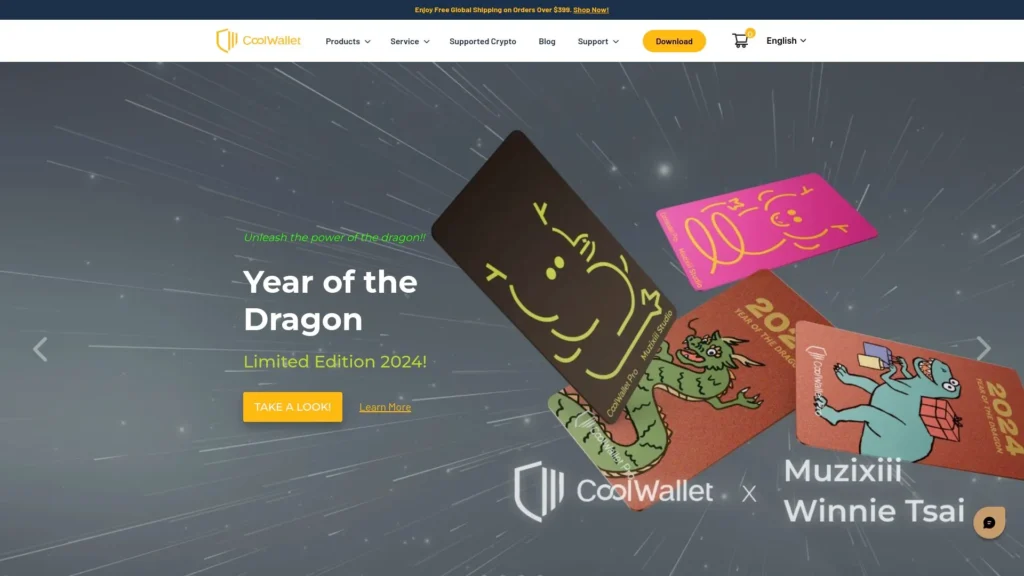
Features
CoolWallet combines the security of a hardware wallet with the convenience we all love in a mobile app. As one of the best crypto wallets in Australia, it’s jam-packed with features like:
- Cold storage protection: Ensures your assets are stored offline for security
- Multi-chain support: Supports multiple blockchain networks, including Bitcoin, Ethereum, Litecoin, and others
- Encrypted Bluetooth communication: Secure connection between the wallet and mobile app
- In-app exchanges: Allows users to exchange cryptocurrencies directly in the app
- Real-time dashboard: Track your portfolio’s value in real time with detailed analytics
- Phishing protection: Built-in phishing detector for added security
Recovery seed: Use a recovery seed to regain access to your wallet if it’s lost or stolen
Pros
- Combines hardware security with software wallet convenience
- Slim, portable design that fits in a regular wallet
- Bluetooth connectivity for easy mobile access
- Supports a good variety of cryptocurrencies
- Built-in exchange and DApp browser functionality
Cons
- Higher price point compared to some other hardware wallets
- Bluetooth connectivity may concern some security-conscious users
- Limited support for lesser-known altcoins
Criteria Evaluation
- Security: 4/5
- Supported cryptocurrencies: 4/5
- User-friendliness: 4/5
- Compatibility: 4/5
- Features: 5/5
- Reputation: 4/5
- Cost: 4/5
- Customer support: 4/5
Community Reviews and Expert Recommendations
Reviews for the CoolWallet are mostly positive with most users talking about how easy it is to store crypto offline with this handy piece of hardware. They talk about how the CoolWallet is made to be durable and can be bent, slightly. Additionally, users state that the CoolWallet is the same size and thickness as a credit card, so you can easily place it into your wallet.
Here’s what others are saying online about the CoolWallet as one of the best hardware crypto wallets in Australia:
“This was the first cold storage wallet i bought. I did not know much about crypto at the time , but i was told i needed a way to take my crypto offline. This was super easy to set up and i like knowing my crypto is safe , and the best thing about it is I can keep it in my wallet.” –Amazon review
Price: Varies (hardware wallet component)
The CoolWallet S hardware device typically retails for around $145.11 AUD, with occasional promotions or bundle deals available. The CoolWallet Pro hardware is also online. The mobile app is free to download and use.
Notable Mentions
Although there are many incredible crypto wallets to choose from that keep your cryptocurrencies in Australia secure on this list, we still thought we’d mention one last wallet:
Coinbase Wallet
The Coinbase Wallet provides an intuitive experience for users, particularly those already immersed in the Coinbase exchange. It’s pretty well-known among the crypto community for its user-friendly design. Additionally, it grants effortless access to decentralised applications (DApps) and DeFi platforms, making it another option to look into.
FAQs
What factors should I consider when choosing a crypto wallet for use in Australia?
When choosing the best crypto wallet in Australia, you need to consider important factors such as if it’s compatible with the type of cryptocurrency you use, the security features and reputation of the wallet provide, how easy it is to use the wallet, the reviews of others, the fees and other costs that come along with using it, and what comes along with creating the wallet. Additionally, you should look at how easy it allows you to convert your currency between AUD and crypto, and if it’s compliant with Australian financial regulations. Essentially, all of these things are important when storing crypto safely.
Are hardware wallets necessary for Australian crypto investors?
Although hardware wallets (cold wallets) aren’t strictly necessary for those that wish to dip their hands in the Australian crypto market, they can be an excellent option for those who want to have some additional security that keeps their crypto safe. For casual investors or even those dealing with small amounts, software crypto wallets may be sufficient enough. However, as your investment grows, it may become much more important to keep your funds safe on a cold wallet and offline. This is why Australian investors should think about a hardware wallet that integrates easily with the ability to exchange locally, that supports AUD transactions.
How do Australian tax regulations affect crypto wallet usage?
To answer that, first we need to understand how is crypto taxed in Australia, and then we’ve explore the specific requirements under the Australian tax law. They require crypto investors to keep detailed records of their transactions for tax purposes. These laws mandate that crypto investors maintain detailed transaction records for tax purposes. So, when choosing a wallet, it’s important to find one that helps you track your crypto effortlessly.
Importantly though, just because you hold crypto in a wallet doesn’t mean you have a tax event in your near future. However, if you trade, spend, or convert the crypto into a fiat currency, it certainly could! This makes it vital for Aussies to look for the best crypto wallets in Australia, the ones that make it super easy to export transaction histories in formats that work with the ATO reporting requirements.
What are the risks of using centralised exchanges as wallets in Australia?
Centralised exchanges (CEXs) come along with many risks in Australia. These include being a target for hackers who can steal large amounts of digital assets, a custodial risk, and a promoter of regulatory issues, as they may freeze accounts or assets. Additionally, they can lead to privacy concerns as they often collect and store user data.
While major Australian exchanges are regulated, they may not offer the same level of security as dedicated wallet solutions. It’s generally recommended to use exchanges for trading and transfer funds to a personal wallet for long-term storage.
When it comes to non custodial vs custodial it’s a no-brainer because a non-custodial wallet gives you total and complete control over your private keys and ultimately your assets. This means that only you can access your crypto, minimising the risk of third-party interference or any regulatory restrictions. With custodial wallets, your assets are in someone else’s hands, which can increase vulnerability to hacks.
How can I ensure the security of my crypto assets in a wallet?
To keep your crypto safe in your wallet, you’re definitely going to want to use strong, unique passwords and activate two-factor authentication (2FA), ideally hardware-based (U2F). Always stear-clear from public Wi-Fi and keep your software wallet as protected as you possibly can against malware by installing regular updates.
Of course, it’s always best to look at the best Android Antivirus Apps when you’re on-the-go to protect your wallet. Additionally, you can try your hand at the 10 Best Free Antivirus Software in Australia that provide real-time protection to keep you safe from online fraud while keeping your crypto wallet safe.
Final Thoughts
When choosing the best crypto wallet in Australia for 2024, it’s essential to really zero in on security, ease of use, and functionality.
From hardware wallets like Trezor and CoolWallet, which provide top-tier offline security, to software wallets like the Zengo wallet and eToro, the best crypto wallet will combine flexibility, security, and ease of use. Additionally, wallets like CoinSpot and other Australian-focused solutions bring localised convenience for managing your crypto within the Australian market. It doesn’t matter if you prefer hardware for long-term storage or software for everyday transactions, the best crypto wallet is there to make sure your digital assets are secure!
Privacy Australia plays an ever-important role in helping Australian users navigate the complex world of online security. While we undoubtedly underscore the importance of safeguarding your personal data, we equally stress the necessity of fortifying your digital assets. Through our meticulously researched, data-driven guides and reviews, we equip our readers with the knowledge needed to make the right decisions regarding privacy and security. We take using VPNs, secure browsers, and choosing the best crypto wallets available seriously.
As you contemplate the ideal wallet for your needs, remember that a combination of wallet types, such as relying on a hardware wallet for long-term safekeeping and a software wallet for daily transactions, can deliver the best of both worlds.
For more detailed comparisons, be sure to check out our guides on the best cryptos to buy and the best crypto exchanges.



